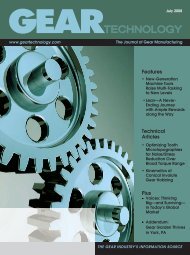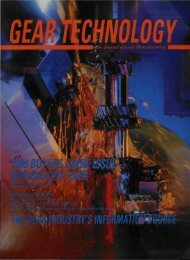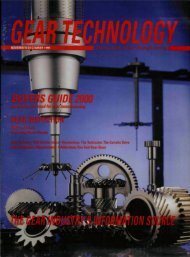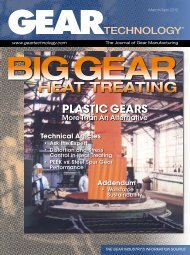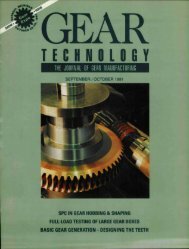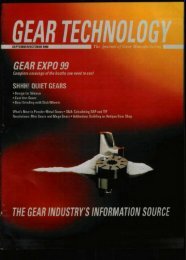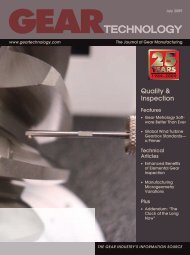Download PDF - Gear Technology magazine
Download PDF - Gear Technology magazine
Download PDF - Gear Technology magazine
You also want an ePaper? Increase the reach of your titles
YUMPU automatically turns print PDFs into web optimized ePapers that Google loves.
Book review<br />
Are We Going<br />
the Way of the<br />
Mayans and Romans?<br />
By Jack McGuinn, Senior Editor<br />
By Joseph L. Arvin and<br />
Scott A. Newton<br />
www.anationonborrowedtime.com<br />
107 pp. APEX Media Solutions.<br />
A recent USA Today front-page<br />
story—“The New Ghost Towns”—<br />
talks about the growing number of<br />
small towns across the country that,<br />
due to job losses in manufacturing, are<br />
becoming virtual ghost towns, with one<br />
21st Century difference—most of the<br />
people still live there. The common<br />
thread running through these towns’<br />
plight is the same—major manufacturing<br />
company offshores jobs and eventually<br />
closes the facility, throwing most<br />
of the citizens out of work. But unlike<br />
in earlier downtimes, there is no option<br />
of “moving to where the jobs are,”<br />
because there are practically no jobs—<br />
certainly not in manufacturing.<br />
This is mentioned merely to make<br />
the point that there really are no new<br />
revelations in “A Nation on Borrowed<br />
Time,” by Joseph L. Arvin, president<br />
of Arrow <strong>Gear</strong> Company and Scott A.<br />
Newton, president of APEX Media<br />
Solutions.<br />
But this is must reading.<br />
The authors devote three of the five<br />
chapters to highlighting the ongoing<br />
deterioration of the American industrial<br />
base and the economic and social ills<br />
that accompany it. They document how,<br />
beginning in the 1970s, the out-sourcing<br />
of skilled manufacturing jobs to rebuilding<br />
countries like Japan or developing<br />
countries such as China was the Trojan<br />
Horse that began the long, sustained<br />
attack on the American middle class<br />
workforce that continues today.<br />
That offshoring of good jobs, as<br />
the authors stress, has led to a severe<br />
depletion of national wealth, which<br />
impacts workers (pay), businesses<br />
(profits) and government (tax base).<br />
Put another way, by exporting what<br />
were once family-supporting, community-sustaining<br />
jobs—jobs that paid<br />
mortgages and taxes, bought automobiles,<br />
put kids through school, etc.—<br />
we are in fact exporting the nation’s<br />
wealth in the bargain while enriching<br />
others’.<br />
A highlight of this book is that the<br />
information is presented in a very concise,<br />
straightforward and, yes, heartfelt<br />
manner.<br />
Given Arvin’s background, a major<br />
goal of his efforts here is to determine<br />
the “root cause” and “corrective<br />
action” of this economic/societal malaise.<br />
Arvin calls out fellow manufacturers<br />
regarding their own culpability:<br />
“American-owned manufacturing has<br />
done very well, American-based manufacturing<br />
is now a shell of what it once<br />
was.”<br />
The authors also point out how—<br />
due to job loss—the shrinking tax base,<br />
especially at local levels, is seriously<br />
impacting education funding for even<br />
the most basic needs.<br />
All of this, according to Arvin and<br />
Newton, is just one set of examples<br />
of how we have, seemingly willfully,<br />
depleted our collective wealth in the<br />
enrichment of our trading “partners.”<br />
And the technology transfers that have<br />
been going on for decades since the<br />
post-WWII Marshall Plan and continue<br />
to this day—like the training of<br />
Chinese CNC operators, for instance, is<br />
yet another example.<br />
So, as Chapter Four asks, “What<br />
Can be Done?” In a nutshell—the<br />
answer is the power of manufacturing,<br />
high-end manufacturing, and all the<br />
value added benefits that flow from it.<br />
Another problem for the American<br />
economy and well-being is apathy.<br />
“Conveying this message and<br />
reaching those who agree with its<br />
content is only a first step,” say the<br />
authors. “If these concepts go no further<br />
than the pages of this publication,<br />
these proposals for corrective actions<br />
will have no chance of being implemented.”<br />
Just how this industrialist renaissance<br />
will occur remains in doubt. The<br />
authors mention the usual things U.S.<br />
manufacturers’ seek—meaningful federal<br />
and local tax breaks, incentives,<br />
monetary reforms and a truly fair playing<br />
field for international trade.<br />
Last—and perhaps of most importance—is<br />
education. In this era<br />
of inflated student grades belied by<br />
declining math and science scores,<br />
declining numbers of engineering<br />
students and very little leadership<br />
from the usual suspects—the<br />
U.S. Congress—it is hard to imagine<br />
improvement anytime soon.<br />
The greatest praise to be directed<br />
toward the authors of this book is<br />
respectful gratitude for their taking<br />
the time to write it. The impending,<br />
decades-in-the-making train wreck that<br />
is the gutting of the middle class and<br />
all that entails is happening in plain<br />
sight. And like the weather, we all talk<br />
about it as if nothing can be done, as<br />
if it were an approaching mammoth<br />
meteor. A Nation on Borrowed Time<br />
proves otherwise.<br />
10<br />
GEARTECHNOLOGY March/April 2010 www.geartechnology.com



